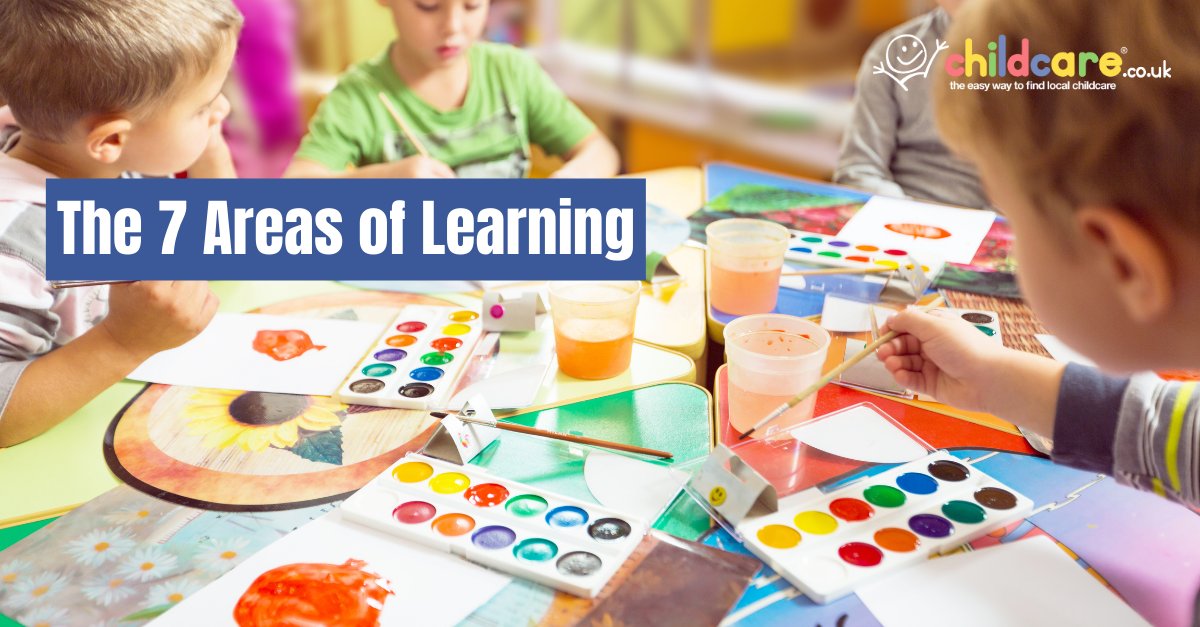The 7 Areas of Learning

There are 7 educational programmes set out in the Early Years Foundation Stage (EYFS) statutory framework
The educational programmes are also known as the 7 areas of learning or the early years curriculum and are split into 3 prime and 4 specific areas:
The Prime Areas
• Communication and language
• Personal, social and emotional development (PSED)
• Physical development
The Specific areas
• Literacy
• Mathematics
• Understanding the world
• Expressive arts and design
The Department for Education (DfE) states that the prime areas are ‘essential for life-long learning’ and the specific areas support children’s learning in the prime areas.
Ofsted use the word ‘curriculum’ for the 7 areas of learning. The curriculum is what you want each child to learn and be able to do during their time in the early years setting.
Ofsted talk about their expectations in detail in the early years inspection handbook.
During an Ofsted early years inspection, providers are asked to explain their curriculum and how they deliver the curriculum:
• The curriculum is the ‘why?’ – the question you ask yourself before you set up an activity – why do I think this is a good plan? Ofsted call it your ‘intent’ and it links to knowledge and skills (what Ofsted call ‘know how’) across the 7 areas of learning.
• The teaching is the ‘how?’ – the question ask yourself when you are delivering the activity – how will I teach, so children learn? Ofsted call it your implementation and it includes your positive relationships with children and families, activities, a quality environment and resources, parent partnerships and much more. Implementation links to speaking and listening, books, songs and rhymes, vocabulary acquisition, movement, maths concepts, life in modern Britain and much more. Ofsted will check that you are delivering a broad, balanced, knowledge rich and carefully sequenced curriculum that covers all 7 areas of learning.
You might say, for example, that your curriculum is what you want children to learn and you deliver this using a blended approach to teaching (modelling, demonstrating, reading books, scaffolding etc) because this approach works best for your current group of children. There are suggestions for delivering the curriculum in the DfE non-statutory Development Matters guidance.
The DfE Help for early years providers website also contains activity ideas for the 7 areas of learning.
Some early years providers also find the Birth to 5 Matters guidance from the Early Years Coalition useful.
During inspection, Ofsted inspectors will also want to check whether the curriculum and teaching has impact – what have children learned? What can they now do that they couldn’t do previously? How have they progressed from their starting points? Are they progressing towards being ready for school and life-long learning? Ofsted link impact links to what children know and remember as they progress through the early years.
Ofsted inspectors will not ask for or look at documentation or lists of activities – they will ask staff to explain their ‘why?’ and ‘how?’ and the impact. They will then ask parents for their view – do parents think that the provider shares information with them about their child’s learning, development and progress? Do parents understand their child’s ‘next steps’ and are they encouraged to support their child’s home learning? DfE has provided some parent guidance which you might find useful.
These guides, linked to all 7 of the educational programmes, are a mixture of theory and practice, curriculum and activity ideas. They are not the early years curriculum – but they are a good starting point, based on the DfE non-statutory Development Matters 2021 curriculum guidance, the DfE ‘Help for early years providers’ activity-based website and including lots of practitioner practice.
There is lots more EYFS guidance and support including curriculum ideas and activity suggestions on the Childcare.co.uk website.
Recently broadcast Childcare.co.uk webinars have covered the prime areas of learning and the role of play in early years education. Watch them again on Webinar Player
There is a useful annual planning overview which can be used alongside these guides to the educational programmes and activity planning.
Educational Programmes
Personal, social and emotional development (PSED) ![]()
Process Art - Mark Making Ideas ![]()
Activity Planning
Communication & Language Activity Planning ![]()
Personal, social and emotional development (PSED) Activity Planning ![]()
Physical Development Activity Planning ![]()
Don’t have an account? Register free today
Create a free account
Sign up in one minute, no payment details required.
Member benefits include:
- Add a free profile detailing your requirements or services
- Search by postcode for local members near you
- Read and reply to messages for free
- Optional paid services available
